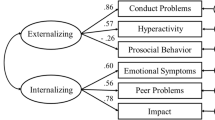Abstract
The role of infant temperament in the development of learning disabilities was at issue. As infants, boys with severe learning disabilities were found to be (1) lower in activity level, (2) more irregular, (3) less approaching, and (4) more negative in mood than “normal” boys. Discussion centered around conceptualizing learning disabilities as the outcome of a developmental process. Thus patterns of early parent-infant interaction are established, based in part upon the infant's temperament, that may evolve into a learning disability.
Similar content being viewed by others
References
Bateman, B. Learning disorders.Review of Educational Research, 1966,36(1), 93–119.
Bell, R., & Harper, L.Child effects on adults. Hillsdale, New Jersey: Erlbaum, 1977.
Bender, L. Problems in conceptualizing and communication in children with developmental alexia. In P. H. Hoch & J. Rubin (Eds.),Psychopathology of communication. New York: Grune and Stratton, 1958.
Browning, R. M. Hypo-responsiveness as a behavioral correlate of brain damage in children.Psycholological Reports, 1967,20, 251–259.
Bryan, T. Learning disabled children's comprehension of nonverbal communication.Journal of Learning Disabilities, 1977,10(8), 501–506.
Carey, W. B. A simplified method for measuring infant temperament.Journal of Pediatrics, 1970,77, 188–194. (a)
Carey, W. B.Survey of temperamental characteristics. No. Maps 01044. New York: Asis National Auxiliary Publications Service, 1970. (b)
Clarke Stewart, A. K. Interactions between mothers and their young children: Characteristics and consequences.Monographs of the Society for Research in Child Development, 1973,38(6–7, Whole No. 153).
Dykman, R. A., Ackerman, P. T., Clements, S. D., & Peters, V. E. specific learning disabilities: An additional deficit syndrome. In H. R. Myklebust (Ed.),Progress in learning disabilities (Vol. 2). New York: Grune and Stratton, 1971.
Fremont, T. S., Selfert, D. M., & Wilson, J. H.Informal diagnostic assessment of children. Springfield, Illinois: Charles C Thomas, 1977.
Goldfarb, W. Effects of psychological deprivation in infancy and subsequent stimulation.American Journal of Psychiatry, 1945,102, 18–23.
Hammill, D. D., & Bartel, N. R. (Eds.).Teaching children with learning and behavioral problems. Boston: Allyn and Bacon, 1975.
Hebb, D. O. The mammal and his environment.American Journal of Psychiatry, 1958,41, 826–831.
Lehr, E.Social perception: An analysis of normal and atypical development. Paper presented at the National Association of School Psychologists' Convention, New York, 1978.
Lewis, M., & Rosenblum, L. A.The effect of the infant on its caregiver. New York: Wiley, 1976.
Myers, P. I., & Hammill, D. D.Methods for learning disorders. New York: Wiley, 1969.
Ohlson, E. L.Identification of specific learning disabilities. Champaign, Illinois: Research Press, 1978.
Scholom, A., Zucker, R. A., & Stollak, G. E. Relating early child adjustment to infant and parent temperament.Journal of Abnormal Child Psychology, 1979,7, 297–308.
Silver, L. B. Familial patterns in children with neurologically based learning disabilities.Journal of Learning Disabilities, 1971,4, 94–106.
Thomas, A., & Chess, S.Temperament and development. New York: Brunner/Mazel, 1977.
Thomas, A., Chess, S., & Birch, H. G.Temperament and behavior disorders in children. New York: New York University Press, 1968.
Thomas, A., Chess, S., Birch, H. G., Hertzig, M. E., & Korn, S.Behavioral individuality in early childhood. New York: New York University Press, 1963.
Author information
Authors and Affiliations
Additional information
The authors would like to express appreciation to George Diamond, director of Pupil Personnel Services for the Addison, Illinois, School District, for his help in obtaining these data.
Rights and permissions
About this article
Cite this article
Scholom, A., Schiff, G. Relating infant temperament to learning disabilities. J Abnorm Child Psychol 8, 127–132 (1980). https://doi.org/10.1007/BF00918167
Issue Date:
DOI: https://doi.org/10.1007/BF00918167




